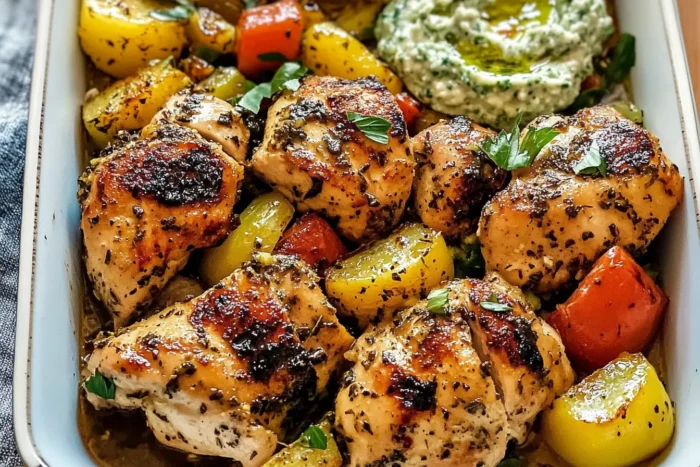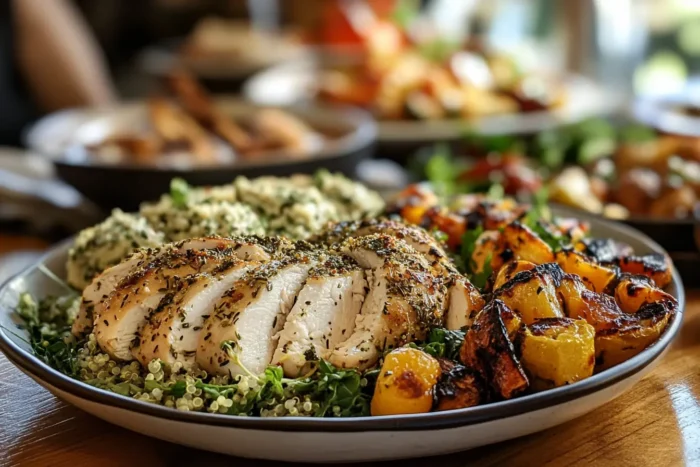Looking for a simple yet flavorful Lemon Herb Chicken Recipe? You’ve come to the right place.It is not only delicious but also healthy. It perfectly blends tangy lemon, aromatic herbs, and succulent chicken.
This dish is versatile and can be served on various occasions. Whether it’s a weeknight dinner or a special event, it’s sure to impress.
We’ll guide you through each step, from marinating the chicken to baking it to perfection. We’ll also share tips on selecting the best herbs and adjusting cooking times based on the size and cut of the chicken.
So, are you ready to cook the best lemon and herb chicken recipe? Let’s get started.
Why Lemon Herb Chicken is a Must-Try Dish
Lemon herb chicken is a must-try dish for its delicious and refreshing flavor profile. The combination of tart lemon with fresh herbs creates a dish that is both vibrant and comforting.
A key benefit of this recipe is its simplicity. You don’t need advanced culinary skills to make this dish succeed. Just follow the steps, and you’ll have a meal that tastes gourmet.
This dish is not only easy to prepare but also healthy. The use of fresh herbs like rosemary, thyme, and parsley adds not only taste but also nutritional value. These herbs are packed with antioxidants and vitamins that boost health.
Moreover, Lemon Herb Chicken is a highly versatile recipe that shines as a main course, in salads, or even in sandwiches, making it an excellent choice for meal planning. Whether served hot or cold, its delightful flavors remain consistently satisfying, perfect for any mealtime setting. For a twist on classic chicken dishes, explore Chicken Stuffed with Stuffing, a comforting and flavorful alternative that’s sure to impress.
Selecting Your Chicken: Breasts, Thighs, or Whole?

Choosing the right chicken cut is essential for your lemon herb chicken recipe. The type of cut you select will impact both cooking time and taste. Whether you prefer white or dark meat, each option has unique benefits.
Chicken breasts are a popular choice for those seeking a leaner, quicker-cooking option. They’re great for a fast weeknight dinner. On the other hand, chicken thighs offer a richer flavor due to their higher fat content, making them ideal for slow-roasting to enhance the taste.
To find the best fit for your needs, consider the following options:
- Chicken Breasts: Quick, lean, and mild.
- Chicken Thighs: Juicy, flavorful, and forgiving if overcooked.
- Whole Chicken: Ideal for gatherings, offers multiple flavors in one dish.
If you’re cooking for a special occasion, a whole chicken might be the star. It provides variety and makes an impressive presentation on your dinner table.
Fresh vs. Dried Herbs: Maximizing Flavor
Herbs are the heart of any lemon herb chicken recipe. They infuse the chicken with delightful aromas and flavors. Choosing between fresh and dried herbs can affect the flavor dynamics of your dish.
Fresh herbs, like rosemary and thyme, deliver vibrant flavors and an appealing aroma. They can transform an ordinary recipe into something extraordinary. However, dried herbs are more convenient and have a longer shelf life. They pack a concentrated punch due to their lack of moisture.
Here’s a quick comparison to help you decide:
- Fresh Herbs: Aromatic, vibrant, visually appealing.
- Dried Herbs: Longer shelf life, cost-effective, stronger flavor.
- Optional: Combine both for balance.
In most cases, using fresh herbs is ideal for that garden-fresh flavor. However, dried herbs are perfect when fresh are unavailable. Both forms have their strengths, depending on your cooking needs.
The Perfect Lemon Herb Marinade
The marinade is the soul of the lemon herb chicken recipe. It embodies the flavors that elevate the chicken from ordinary to extraordinary. Crafting a delightful lemon herb marinade is simple but requires attention to detail.
Start with fresh lemon juice for a burst of citrus flavor. It tenderizes the chicken and adds a zesty kick. Add olive oil for richness and garlic to enhance the dish’s savory notes.
Herbs, both fresh and dried, are integral. Rosemary, thyme, and parsley are popular choices, each adding their distinct aroma. A touch of salt and pepper brings out these flavors, making every bite satisfying.
Here’s what you’ll need for the marinade:
- Lemon Juice: Freshly squeezed for the best flavor.
- Olive Oil: Adds smoothness and richness.
- Garlic Cloves: Bring a bold, savory element.
- Rosemary, Thyme, Parsley: Provide aromatic depth.
- Salt and Pepper: Essential for seasoning.
Craft this marinade, and let the herbs and citrus work their magic on the chicken.
by Tirza van Dijk (https://unsplash.com/@tirzavandijk)
Ingredients You’ll Need
Before you start marinating, ensure you have all the ingredients ready. Each component contributes to the overall flavor profile.
Firstly, gather your chicken. Breasts, thighs, or a whole chicken are all excellent choices. Opt for high-quality, organic pieces for the best results.
For the marinade, these are essential:
- 2 Lemons: Juiced and zested.
- 1/4 Cup Olive Oil: Rich base for the marinade.
- 3-4 Garlic Cloves: Minced finely.
- 2 Tbsp Fresh Rosemary: Chopped.
- 1 Tbsp Thyme Leaves: Removed from stems.
- Salt & Black Pepper: To taste.
Gathering these ingredients beforehand ensures a smooth cooking process. With everything in hand, you’re ready to start.
Marinating Your Chicken: Tips and Tricks
Marinating is key to infusing the chicken with flavor and tenderness. Begin by patting the chicken dry, ensuring the marinade adheres well.
Allow the chicken to marinate for at least 30 minutes. For deeper flavors, refrigerate it for a few hours, or even overnight. This extra time allows the marinade to fully penetrate the meat.
For thorough marination, use a zip-top bag. It helps distribute the marinade evenly around the chicken pieces. Squeeze out excess air before sealing, allowing the marinade to envelop the chicken.
Avoid over-marinating. While longer marinating enhances flavor, more than 24 hours can break down the meat too much. For best results, find the right balance and stick to it.
Cooking Your Lemon Herb Chicken to Perfection
Cooking lemon herb chicken to perfection requires attention to detail. Start by preheating your oven, ensuring an even cooking temperature. This step helps the chicken cook evenly and retain its natural juices.
Use a baking dish that comfortably fits the chicken pieces without crowding. Crowding can lead to uneven cooking and less crispy skin. Arrange the marinated chicken pieces in the dish, ensuring they do not overlap.
As the chicken bakes, the aroma of lemon and herbs will fill your kitchen. This savory smell is a good sign that flavors are melding well. You can choose to baste the chicken with leftover marinade for added moisture and flavor.
For the ultimate presentation and taste, consider finishing the chicken under the broiler. This final touch creates a golden, crispy exterior while keeping the inside juicy. Always keep a watchful eye to prevent over-browning.
Preparing Your Oven and Baking Dish
To start, preheat your oven to the required temperature, typically around 375°F (190°C). This ensures your chicken cooks evenly from the moment it enters the oven.
Choose a baking dish made of glass or ceramic. These materials promote even heat distribution. Lightly coat the dish with olive oil or a cooking spray to prevent sticking. This simple step also contributes to a delightful crispy exterior.
Baking Time and Temperature Guide
When it comes to baking chicken, time and temperature are key. An ideal baking temperature is 375°F (190°C). At this heat, chicken breasts bake for about 25-30 minutes, depending on size. Thighs may take a few minutes longer.
A whole chicken requires a longer baking time, roughly 60-75 minutes. Regardless of the cut, check for doneness using a meat thermometer. The internal temperature should reach 165°F (74°C). This ensures that the chicken is safe to eat and perfectly juicy.
- Breasts: 25-30 minutes
- Thighs: 35-40 minutes
- Whole Chicken: 60-75 minutes
These guidelines will help you achieve an inviting, flavorful dish while making sure your lemon herb chicken is well-cooked.
Ensuring Your Chicken is Cooked Through
To ensure chicken is cooked through, a meat thermometer is invaluable. Insert it into the thickest part of the meat, without touching bone. The magic number is 165°F (74°C) for perfect doneness.
Visual cues can also guide you. Clear juices running from the chicken and slightly retracting meat from bones indicate readiness. Allowing the chicken to rest for a few minutes after baking retains juiciness.
These steps help ensure your lemon herb chicken is not just cooked, but perfectly delicious and juicy, ready to be served.
Serving Suggestions: Complementing Your Lemon Herb Chicken

Lemon herb chicken pairs beautifully with a range of side dishes. The fresh, zesty flavors are versatile, allowing you to choose your favorite accompaniments. Aim for sides that enhance and balance the dish’s vibrant taste.
Consider serving the chicken with a mix of roasted vegetables or a leafy green salad. These healthy sides keep the meal light and nutritionally balanced. You can opt for grains like quinoa or couscous for a heartier choice.
For a Mediterranean twist, serve with tzatziki or hummus as dips. These add creamy texture and additional flavor layers. Garnish with extra lemon wedges and sprigs of fresh herbs for visual appeal.
- Roasted vegetables
- Green salad
- Quinoa or couscous
- Tzatziki or hummus dips
For bread pairings, try the easy French bread to complete the meal. Or, opt for gluten-free bread for a healthy meal.
These suggestions ensure your Lemon Herb Chicken meal is not only delicious but also visually stunning and satisfying, creating a dining experience that delights both the palate and the eyes.
Health Benefits of Lemon Herb Chicken
Lemon herb chicken is not only delicious but also packed with nutritional benefits. The use of fresh herbs and lemon adds a burst of vitamins and minerals. This dish is an excellent source of lean protein, which is essential for muscle growth and repair.
The olive oil used in the recipe is rich in healthy fats, which support heart health. The herbs, such as rosemary and thyme, contain antioxidants that help fight inflammation. Combined, these ingredients contribute to a wholesome meal that’s both tasty and health-conscious.
Storing and Reheating Leftovers
Proper storage of lemon herb chicken ensures that it remains fresh and flavorful for future meals. Once the chicken has cooled, transfer it to an airtight container. Refrigerate the leftovers within two hours to maintain safety.
Reheating leftovers is straightforward. Preheat your oven to 350°F (175°C), and cover the chicken with foil to retain moisture. Heat for about 20 minutes until warmed through. Alternatively, use a microwave, but be cautious of overcooking. Enjoy your lemon herb chicken just as you did the first time.
Customizing the Recipe: Variations and Substitutions
One of the best aspects of this lemon herb chicken recipe is its flexibility. You can easily adapt the dish to suit different tastes or dietary needs. Small tweaks can transform it into a new culinary delight.
For a bit of heat, try adding chili flakes or cayenne pepper to the marinade. If you prefer a sweeter note, a splash of honey or maple syrup can add depth. Experimentation can lead to wonderful surprises.
Consider these substitutions to make the recipe unique:
- Herbs: Swap thyme or rosemary with basil or oregano.
- Citrus: Use lime or orange juice instead of lemon for a new flavor.
- Cooking Method: Grill or pan-fry the chicken for different textures.
With endless possibilities, this recipe can be a regular on your menu while staying exciting.
Conclusion: Your New Go-To Chicken Recipe

Delicious, easy, and versatile, this lemon herb chicken recipe is a winning choice for any meal. The simplicity of the ingredients, paired with the robust flavors of lemon and herbs, makes it irresistible.
Whether you’re cooking for family or hosting friends, this dish is sure to impress. With its health benefits and adaptability, it’s perfect for anyone looking to enjoy a wholesome meal. Keep experimenting with flavors and techniques to make it your own. Embrace the simplicity and taste the goodness with every bite. This recipe is sure to become a staple in your kitchen.
